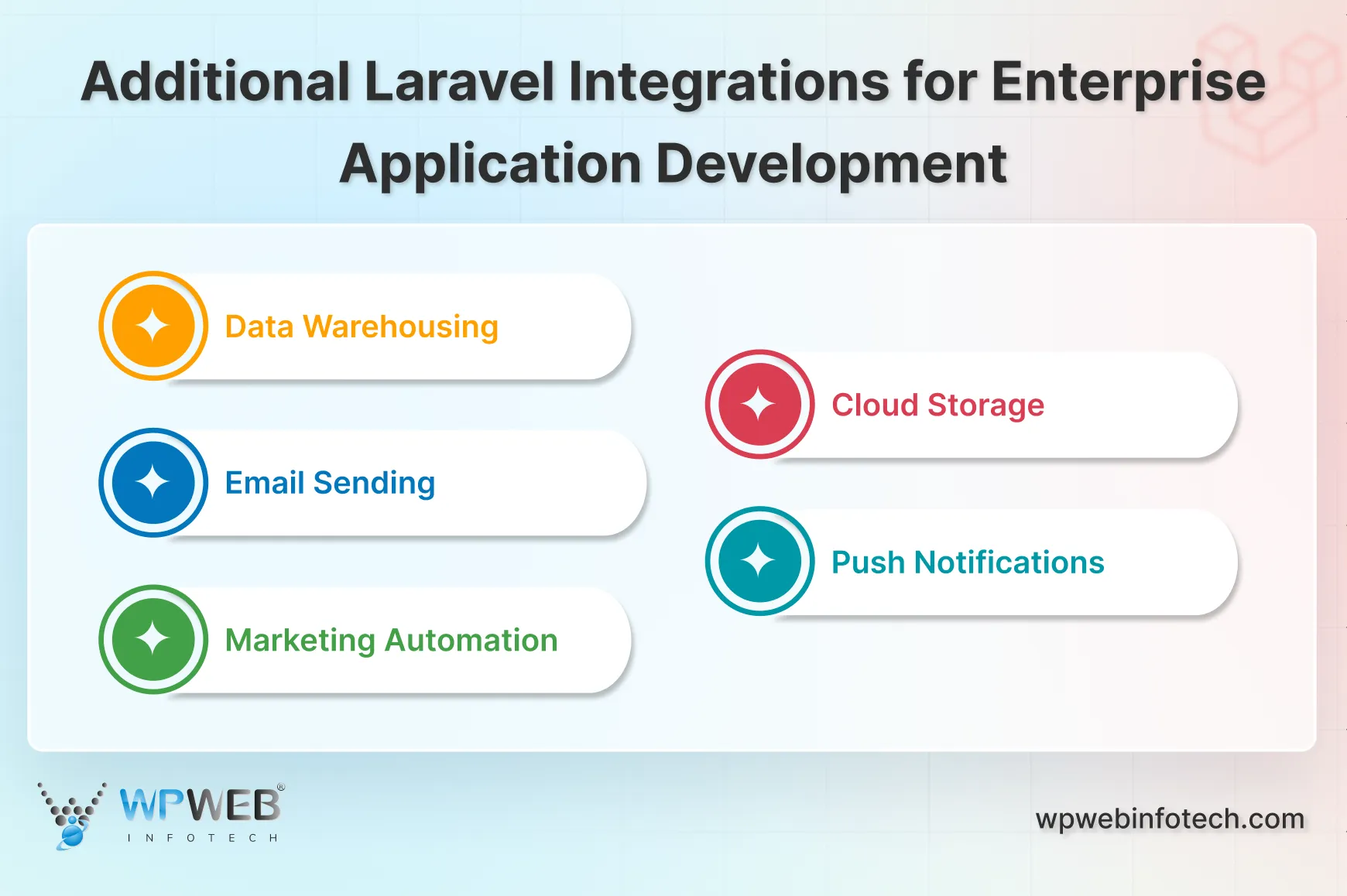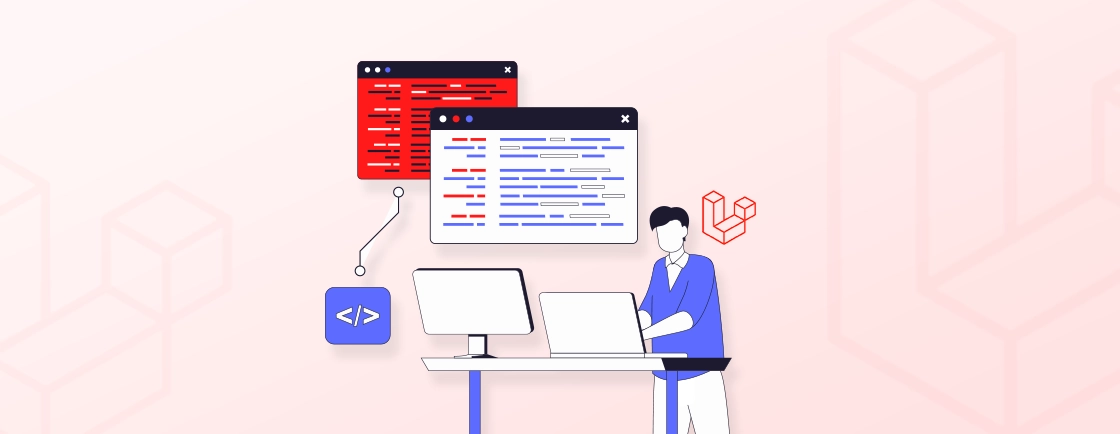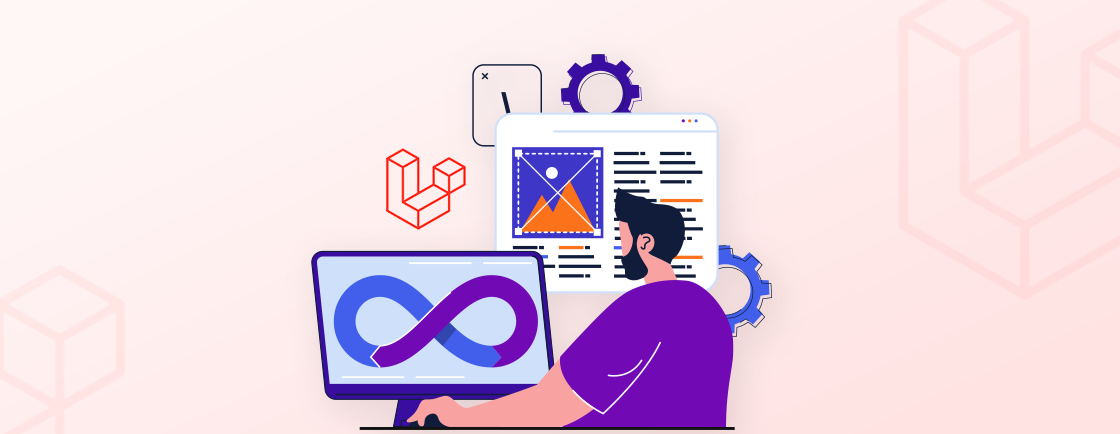Quick Summary
Laravel offers built-in features such as robust security gates, elegant ORM for scalable database interactions, and a modular package system. They directly address core enterprise challenges: long-term maintainability, security compliance, and seamless integration. That’s why Laravel is backed by significant market share and used by major companies for sustainable business growth.
Table of Contents
Enterprise-scale software demands more than just functional code. You require a foundation built for security, scalability, and long-term maintainability. That’s where Laravel comes in.
Laravel’s elegant syntax accelerates application development. But what makes it excellent is its built-in tools for testing, security, and modular architecture. They deliver the operational resilience and developer efficiency necessary for sustainable growth.
In this blog, we’ll discuss Laravel for enterprise app development, addressing the market share, functionalities, benefits, and more.
Is Laravel Suitable for Enterprise Application Development?
Building a robust and scalable enterprise application requires the right tools. Laravel, the popular PHP framework, often emerges as a strong contender. But is it suitable for your ambitious project? Let’s explore the key benefits it offers and see if it aligns with your needs.
- Rock-Solid Security. Laravel prioritizes data and user safety with built-in features. It includes; secure password hashing, CSRF protection, and robust authorization mechanisms.
- Effortless Scalability. Designed for horizontal scaling, Laravel adapts to growing user bases.
- Agile Development. It employs MVC architecture and Artisan CLI. Thus, streamlines development processes.
- Customizable Ecosystem. Extensive libraries and packages offer pre-built functionalities. While dependency injection promotes code flexibility.
Laravel boasts an impressive set of features. This makes it a strong contender for your enterprise application. It focuses on security, scalability, and development efficiency. Thus, ensures alignment with the demands of complex enterprise projects.
Yet, the best choice depends on your specific needs and project scope. Weigh the benefits against your requirements and conduct thorough research before beginning with a roadmap.
Laravel Market Share & Usage Statistics
As you may already know, Laravel is one of the most popular PHP frameworks. The key reason behind that is the availability of tools and features to build the best web application.
According to the latest stats, Laravel is used by over 636k live websites. Laravel holds a dominant share of the PHP framework market. Its usage statistics often surpass the combined total of its closest competitors, Symfony and CodeIgniter.
Laravel has over 82k stars on Github and a massive, active community of developers. That ensures continuous innovation, robust third-party package support, and readily available expertise.
That’s why the experts consider a Laravel enterprise application as an excellent option for long-term projects. For businesses exploring digital retail solutions, Laravel for eCommerce explains how the same framework can power robust and scalable online stores.
Features of Laravel for Enterprise Application Development
Laravel often steps at the forefront of discussions surrounding enterprise application development. But does its popularity translate into real-world benefits for your complex project? Absolutely! Let’s move beyond the hype and dive into the core of Laravel. We’ll explore key functionalities that make it a compelling choice for enterprise aspirations.

1. MVC Architecture
The Model-View-Controller (MVC) architecture plays a central role in enterprise application development. It ensures clean code organization, modularity, and maintainability.
- Separation of Concerns. MVC separates data (Model), presentation (View), and business logic (Controller), leading to:
- Improved code organization. Each component has a distinct role. This makes the codebase easier to understand and navigate.
- Enhanced maintainability. Changes in one area (e.g., View) rarely impact others (e.g., Model). Simplifying maintenance and updates.
- Reusability. With reusable components, you can create new features and functionalities without rewriting code.
- Testability. The clear separation of concerns facilitates unit testing for each component. This offers code quality and stability.
- Flexibility. The modular nature of MVC allows integration with third-party libraries and frameworks.
Using MVC architecture, Laravel empowers you to build scalable, and maintainable enterprise applications. Its combination of clean code organization and flexibility makes it an ideal choice. It can tackle even the most demanding enterprise projects.
2. Blade Template
Laravel’s Blade templating engine offers a powerful yet elegant tool. Letting you build appealing interfaces. More than a templating engine, Blade empowers to sculpt pixel-perfect UIs that stand the test of time and user demands.
- Clean Syntax. Blade offers a concise and readable syntax, blending with HTML. This makes it easy for developers of all levels to pick up and use.
- Expressive. Despite its simplicity, Blade doesn’t take a step back from complexity. It includes conditional statements, loops, and other control structures. Allowing for dynamic content generation.
- Reusable Components. Define reusable components like headers, footers, and sidebars. This will reduce code duplication and ensure a consistent user experience across the application.
- Security-Conscious. Blade’s built-in escaping mechanisms prevent cross-site scripting (XSS) vulnerabilities.
- Community Driven. Blade boasts a trove of ready-to-use components and packages. This benefits in accelerating development and enriching your UI options.
Blade is more than a templating engine; it’s a design philosophy. With its expressive power and reusable components, you can build intuitive and scalable UIs. Each of these can cater to the diverse needs of enterprise users.
3. Artisan CLI
Picture an enterprise application environment where repetitive tasks vanish with a few keystrokes. Laravel’s Artisan CLI, or command-line interface, is a productivity powerhouse. It streamlines workflows and empowers developers to focus on what matters most.
- Automation. Overcome repetitive tasks like creating models, controllers, migrations, and tests. Artisan automates them all, saving you valuable time and freeing you to tackle other tasks.
- Consistency. Ensure consistency across your codebase with Artisan’s standardized commands.
- Customizable. Artisan isn’t just pre-packaged commands; it’s a platform for building your own. You can build custom commands tailored to your specific project needs.
- Deployment. Artisan offers commands for efficient database seeding, cache clearing, and asset optimization.
- Testing. Unit testing is crucial, but writing tests can be time-consuming. Artisan helps you create unit tests, allowing you to write more tests with less effort.
Artisan CLI is a philosophy of efficiency, consistency, and developer empowerment. In the fast-paced world of enterprise application development, every second counts. Consider using Laravel Artisan, and watch your enterprise application skyrocket.
4. Dependency Injection
Building complex enterprise applications with Laravel often involves dependencies between components. Without careful management, these dependencies can lead to coupled code, hindering maintainability.
- Loose Coupling. Need to switch databases or payment gateways? No code changes are required! Just inject a new implementation. Changes in one component stay isolated, preventing effects and simplifying updates.
- Modular Design. Reuse components across modules, accelerating development and saving time. Scale individual modules independently as your application grows, maximizing efficiency.
- Dependency Management. define dependencies and their configurations in a central location. Manage the creation, injection, and destruction of dependencies.
- Testing Transformation. DI makes mocking dependencies a breeze, boosting your testing prowess. Test specific units of code without external influences, guaranteeing reliable tests.
With Laravel Dependency Injection, you unlock a level of flexibility and maintainability. For loose coupling to modular design Laravel Dependency Injection is the key. It lets you build applications that scale with your ambition. A practical example of this scalability can be seen when you build a CRM with Laravel, leveraging its structure to manage data, teams, and customer workflows efficiently.
5. Authentication and Authorization
Within the complete enterprise application development, security stays supreme. Laravel’s authentication and authorization system stands as your formidable guard. This safeguards your application and maintains your user base.
- Granular Control. Define user roles and permissions with precision. Granting access to specific features and data based on individual user needs.
- Seamless User Experience. Streamline the login and registration process with Laravel’s pre-built features.
- Scalable Security. As your user base grows, Laravel’s authentication and authorization system scales. This protects your data without compromising performance.
- Reduced Development Time. Leverage Laravel’s out-of-the-box functionalities and avoid reinventing the security wheel.
Building a secure enterprise application without authentication and authorization is like building a castle without walls. Laravel offers a powerful toolkit to create an impenetrable fortress, protecting your data, and ensuring user trust.
6. Horizontal Scaling
As your enterprise application grows, its demands on servers and infrastructure increase. Vertical scaling, adding more power to a single server, has its limits. Here’s where Laravel horizontal scaling shines. A technique where you distribute workloads across multiple servers. This will ensure your application can handle surging user traffic and increasing data demands.
- Effortless Load Balancing. Distribute incoming requests across multiple server instances. You can do so with Laravel’s compatibility with popular load balancers like Nginx and HAProxy.
- Database Replication. Avoid bottlenecks by replicating your database across many servers. Create read-only replicas for handling frequent queries, and improving data accessibility.
- Stateless Sessions. Eliminate session storage on individual servers. Allowing users to switch between servers without losing data.
- Caching. Implement caching strategies at various levels (application, framework, database). This reduces database load and improves response times.
- Cloud-Ready Architecture. Leverage the power of cloud platforms like AWS, Azure, or GCP. It integrates your horizontally scaled Laravel application. Its elastic scaling capabilities benefit with effortless growth on demand.
Laravel’s architecture empowers you to build an enterprise application that can handle growth. Explore powerful Laravel performance optimization practices. This will tap you into the cloud’s potential to future-proof your enterprise application.
7. Caching Mechanisms
Building enterprise applications from scratch can be time-consuming and resource-intensive. Fortunately, the Laravel ecosystem boasts a set of pre-built components and packages. This injects functionality and saves you valuable development time. If your enterprise app involves online sales, check how Laravel simplifies store creation using its Laravel eCommerce Package for seamless product management and transactions.
- User Management. Streamline user registration, authentication, and authorization. Utilize packages like Laravel Sanctum or Spatie Laravel Permission.
- DataTables & Grids. Present large datasets interactively with pre-built components like YajraBox or DataTables. Each of them offers sorting, filtering, and pagination functionalities.
- eCommerce Functionality. Skip building an e-commerce engine from scratch. Consider leveraging packages like SnipeCart, which provide a solid foundation for online stores.
- Payment Gateways. Simplify payment integrations with Laravel Cashier or Laravel and Stripe integration. Enabling seamless integration with popular payment gateways.
- PDF Generation. Generate professional-looking PDFs for invoices, reports, or certificates with Barryvdh PDF or PDFcrowd. This eliminates the need for complex external libraries or manual formatting.
Pre-built components are not shortcuts; they’re strategic time-savers. With these practices, you can build enterprise applications with a higher degree of quality. Facing any complexity in deploying any of them? Or seeking tailored solutions for your enterprise application? Then get dedicated assistance from a Laravel development agency.
Additional Laravel Integrations for Enterprise Application Development
Indeed, pre-built components offer a fantastic way to accelerate development. But, Laravel’s additional integration capabilities extend far beyond these pre-packaged solutions. Here are some key areas where Laravel shines for enterprise application development:

1. Data Warehousing
Uncover deeper insights by extracting, transforming, and loading your data into data warehouses. Consider using tools like Amazon Redshift or Snowflake. Laravel’s community-driven packages and pre-built connectors simplify the process. Letting you extract valuable business intelligence.
2. Cloud Storage
Ditch on-premises limitations! And experience the scalability of cloud storage solutions like AWS S3 or Azure Blob Storage. Laravel’s integration libraries ensure smooth interaction with your chosen provider. This keeps your data secure and accessible. For instance, Laravel’s same flexibility and cloud compatibility are key advantages when building a property listing app with Laravel, enabling effortless image storage and data retrieval.
3. Email Sending
Streamline communication with robust email-sending services like SendGrid or Mailgun. Send transactional emails and launch targeted marketing campaigns from your Laravel application. Leveraging Laravel-specific libraries makes the process even flawless. It integrates email into your application’s workflow.
4. Push Notifications
Foster real-time engagement with your users. Leverage personalized notifications through services like Firebase Cloud Messaging or Pusher. Keep them informed of updates, deliver alerts, and create dynamic user experiences. All within the familiarity of Laravel packages like Laravel Push Notifications.
5. Marketing Automation
Elevate your marketing efforts by integrating with leading platforms like HubSpot or Marketo. Automate tasks like lead nurturing, email campaigns, and personalized journeys. Laravel’s powerful API capabilities ensure connections. Empowering you to leverage the potential of marketing automation tools.
Laravel’s integration capabilities extend far beyond these five initial examples. Consider it a gateway to a vast ecosystem of tools and services, ready to enhance your enterprise application in countless ways. Remember, the key is to identify those that align with your unique project needs.
By selecting and integrating these powerful tools, you unlock a world of possibilities. This empowers your Laravel application to not only meet enterprise demands but outshine them. So, dive deeper and build an enterprise application that thrives in today’s ever-evolving landscape.
Laravel Enterprise Application Development With WPWeb Infotech
Inherently, Laravel is a user-friendly development platform. But still, for something like a high-performance Laravel enterprise application requires specialized expertise. That’s where partnership with a professional agency like WPWeb Infotech becomes critical.
WPWeb Infotech specializes in leveraging the framework to build custom Laravel enterprise applications tailored to complex business workflows. Our development process emphasizes the core enterprise tenets of robust security architecture, scalable database design, and seamless third-party integrations.
With WPWeb Infotech, you gain more than just code. You acquire a strategic asset built for growth. It’s backed by a team proficient in transforming Laravel’s capabilities into tangible competitive advantage.
Let’s Conclude
Robust features, streamlined development process, and vast ecosystem. Covering each of them, Laravel has solidified itself for building mission-critical enterprise applications. It covers everything from structured MVC architecture to the powerful Artisan CLI. With these functionalities, Laravel empowers you to build scalable and secure enterprise applications.
Its integration capabilities further bolster its appeal. This allows you to connect with essential services. This includes; data warehouses, cloud storage, and marketing automation platforms. This flexibility ensures your application evolves alongside your business needs.
Have a envision of your enterprise application but don’t know where to begin? Then hire Laravel developers with us today!
FAQs About Using Laravel for Enterprise Application Development?
Can Laravel integrate with other enterprise systems and APIs?
Yes, it can! Laravel boasts robust API capabilities. It lets you connect with various enterprise systems and external APIs. You can also leverage pre-built libraries or craft custom integrations to exchange data. Thus, enables you to ensure smooth communication between applications and the enterprise ecosystem.
Is Laravel suitable for microservices architecture in enterprise applications?
Laravel adopts microservices architecture. Its modular nature and dependency injection features align with this approach. Promoting independent development for complex enterprise applications. Break down functionalities into self-contained microservices. Deploy them, and enjoy the flexibility of this modern architecture.
How does Laravel handle real-time features in enterprise applications?
Laravel offers various tools for building real-time functionalities. You can integrate with services like Pusher or Socket.IO to enable real-time communication. Broadcast events, send push notifications, and create dynamic experiences. It will help you to keep users engaged and informed in real-time.
Build Powerful Laravel Applications
Learn how to leverage Laravel's powerful features for efficient and scalable web development.





